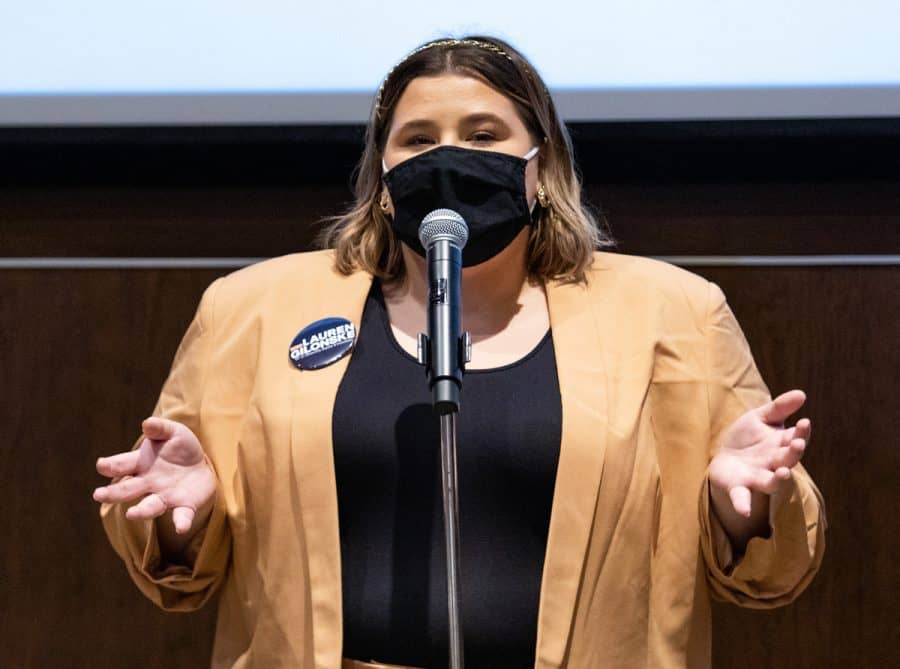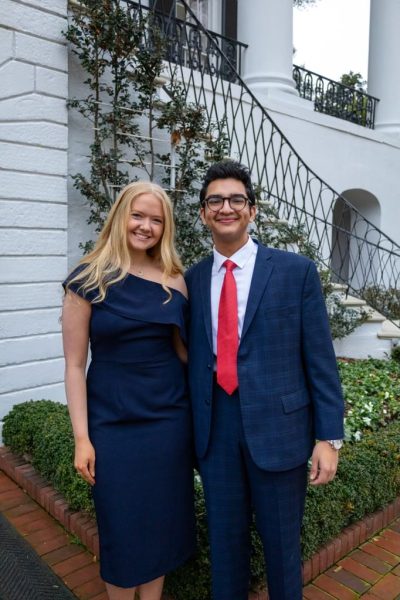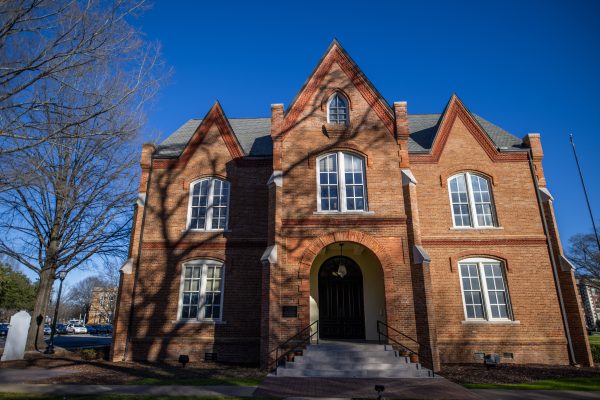‘White, wealthy and Greek’: This year’s uncontested SGA races draw criticism from senate candidate
The executive candidate slate does not accurately represent the University’s student demographics.
Lauren Gilonske, candidate for vice president of diversity, equity and inclusion, speaks at the executive candidate forum on Sunday night.
March 1, 2021
The Student Government Association’s (SGA) executive candidates are running unopposed once again, and this year’s panel boasts less diversity than the current executive officers.
The current group of executive officers includes three women and five men, and two of the seats are occupied by Black students. Of this year’s eight candidates, there are four women and four men, and no students of color.
Lauren Gilonske, this year’s candidate for vice president of diversity, equity and inclusion (DEI), said she does not take the lack of diversity among candidates lightly and will hold herself accountable for her privileges as a cisgender straight white woman.
“Although I am completely confident in my experiences and qualifications,” Gilonske said, “I do still acknowledge that my understanding of the issues and the differences of what I’ve experienced as a white woman are vastly different than a minority or marginalized student on this campus.”
She said her “passion for listening, learning and advocating extends endlessly.” In this position, Gilonske said she hopes to encourage others to expand diversity in SGA.
She will be the fourth person to hold the position, which was established in October 2018 through a senate bill. Originally categorized as a director position, it was promoted to the executive level to mirror the structure of the university’s administration.
The SGA appointed its own VP for DEI in Fall 2018 following the bill’s approval. Current President Demarcus Joiner was then elected for the position in the spring, followed by Caitlyn McTier the next election cycle. McTier currently holds the position.
When the position was created, then-SGA president Price McGiffert said the VP of DEI was the only position missing from the SGA council.
When the current SGA president, Demarcus Joiner, appeared at a public forum during last year’s election cycle, he acknowledged the ugly “past” of the SGA. Joiner ran unopposed for his position and called the lack of opposition “bittersweet.”
“Although I would love to have students actively engaged in the SGA elections, I also feel blessed to know that the student body has a qualified candidate running to become the next SGA president,” he said.
Joiner said the number of uncontested seats demonstrates the caliber of the candidates. He said the student body believes in the message of his successor, presidential candidate Jill Fields. Joiner also said this year’s panel of candidates reflects growth in the organization.
“There are a lot of women running and I think that just goes to show that females and women are moving forward, and that everyone has the opportunity and this is not a male-driven organization,” Joiner said.
Fields acknowledged the lack of diversity among this year’s executive candidates, but said she cannot control who runs.
“I can only control myself,” Fields said. “I have never had to be in a situation or never experienced anything that any of our minority students have experienced, but I’m hoping that I can advocate for them.”
Fields said she hopes to build a diverse cabinet to compensate for the lack of diversity among executive officers, adding that she will recruit people who are interested in advocating for different student groups. The cabinet includes positions like deputy chief of staff, speaker of senate, press secretary and a host of director positions, among others.
Arts and Sciences senate candidate John Dodd said the uncontested executive seats and the lack of diversity in this year’s election are because of Machine influence.
“This just shows that the SGA has perfected their tactic of striking fear into our student body,” he said. “We have an overwhelming amount of independent student leaders to run for these positions, student leaders who wanted to, but the Machine is so powerful that these amazing student leaders are discouraged to run because they know that they may receive threats, harassment, or even be assaulted, strictly off the basis that they are challenging the authority of the Machine.”
Dodd also said that the lack of diversity in candidates demonstrates that both the Machine and current student leaders “only care to promote the best interest of those that are white, wealthy and Greek on this campus.”
He said that the Machine has the “ability to run whatever candidates they please” and that they continue to make minority groups at UA feel unrepresented.
Last year, the senate had contested races in two colleges, making it the least contested SGA election in 70 years. In this year’s senate races, there are 54 candidates running for 50 seats.
Of the 54 candidates, about 13% are students of color, which underrepresents this population for UA students. Candidates roughly represent the gender demographics of campus, based on biographies and photos provided by the SGA election page.
The colleges of engineering, nursing and social work have the same number of candidates as they do seats available, while the graduate and law schools don’t have enough candidates running to fill seats. In fact, the Law School has no candidates running to fill its two seats.
Five colleges have contested races this year: the College of Arts and Sciences, the Culverhouse College of Business, the College of Communication and Information Sciences, the College of Human Environmental Sciences and the College of Education.
Gerardo Aguilera contributed to the reporting of this story.











